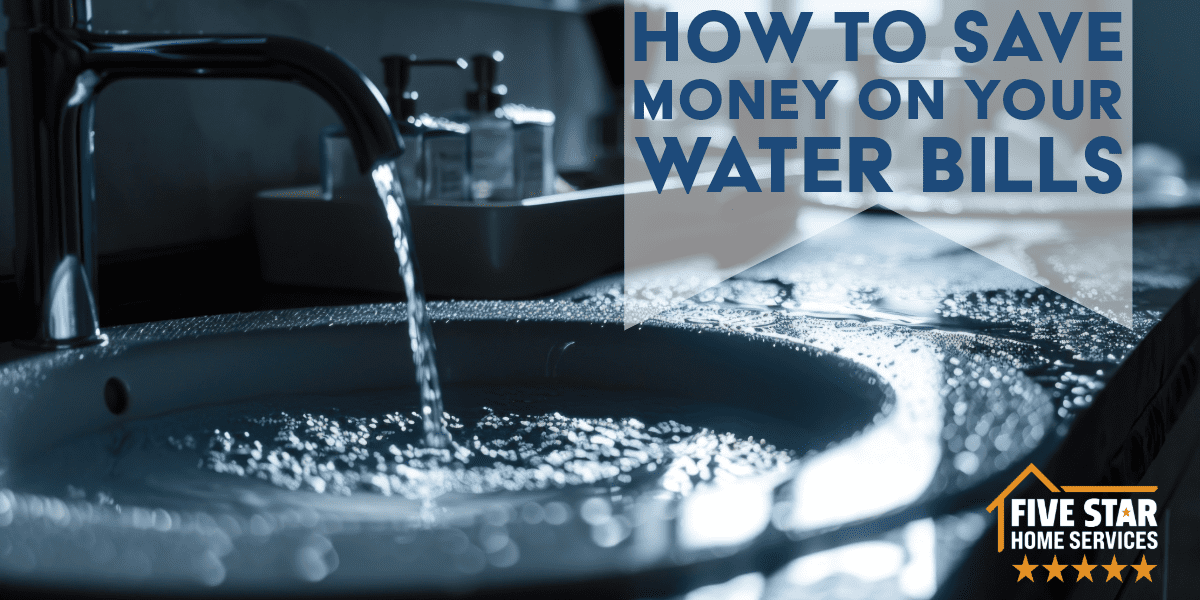Wondering if there was a way to lower your water bill? With everything costing so much more these days, it is wise to look at ways of cutting costs wherever possible. Conserving water is not only an environmentally impactful habit to practice but also helps to eliminate the unnecessary financial drain of wastefully using water. The US Environmental Protection Agency (EPA) states that since water is a finite source, there is an expected water shortage in at least 40 states over the next several years. Nevertheless, the average use of water in a typical household is more than enough. Surely, there are plenty of ways to cut down on the amount of water used daily, either by making some changes or maintaining the plumbing system in the home and repairing any plumbing issues. Conserving water means lower water bills and more money in your pocket.
Focusing on Water Usage
The average American household consumes 300 gallons per day, and although estimates can vary, the average person alone goes through 80-100 gallons per day. According to USGS.gov, water is used largely for flushing the toilet. Showers and baths come in second. A single flush from a traditional toilet needs 1.6 gallons of water. If you are in the shower with a regular shower head and regular pressure, water use is easily 2.5 gallons per minute. This adds up to 25 gallons for a 10-minute shower! The modern household constantly uses appliances that make washing dishes and clothes more convenient and of course, contribute to the daily consumption of water. This is on top of other things we do with water, such as drinking, washing our hands, brushing our teeth, watering plants, washing the car, or just any of the household tasks wherein we must use water. In Ohio, the average monthly water bill is $47.73 (average sewer bill is $48.73). Since the water bill is dependent on the amount of water used, it is possible to lower the monthly water bill. In all these instances, water that we actually need to use can be reduced. It just requires a little bit of conscious effort as to how we use water. By monitoring the average daily water use, an individual can certainly use less than 100 gallons and save money in the process.
Ways to Lower Your Water Bill
What are the ways in which we can save water and thus lower our monthly water bill? Some are easy to apply in our daily lives, while others will need to be given more attention to. Take a look at some of the many ways we can integrate the habit of using less water yet still accomplish what we need water for:
- Turn off the faucet when not in use. This is the simplest and easiest way to get into the habit of conserving water. For instance, turn off the running water in the sink when you need to lather up. When brushing your teeth or shaving, use a cup to hold the water needed for rinsing. This habit alone can save up to 4 gallons per day, with each person in the household.
- Turn off water in the shower when lathering up. Similar to the previous suggestion, you can conserve water while in the shower by turning it off when applying soap, shampoo, or just lathering up. Considering that 2.5 gallons of water is possibly wasted every minute while just soaping up, this is potential savings!
- Choose to shower rather than take a bath. Filling the bathtub requires an average of 40-60 gallons of water. If you want to see some savings, refrain from having to do a soak in the tub unless necessary. Showers are comparatively more cost-effective.
- Take shorter showers. Make efficient use of water by showering for an appropriate length of time. In other words, avoid lingering in the shower, and you could see savings in your water bill.
- Upgrade to energy-efficient appliances. Modern dishwashers and washing machines can run on less water than their standard counterparts. If washing a full load of dishes, using the dishwasher is more efficient than washing them. Energy Star-rated appliances require the use of less water at 3.5 gallons per cycle. Handwashing uses about 2 gallons of water per minute, which undoubtedly will not even cover a full load in that amount of time. The same is true with washing machines that can be very efficient if washing a full load of clothes. Make sure to upgrade to one that has the Star Energy label. Use less detergent so that there will be no need for an extra rinse.
- Use an energy efficient shower head. As stated previously, a regular shower uses 2.5 gallons per minute. The U.S. Environmental Protection Agency (EPA) instituted a program called WaterSense, and if water fixtures are certified with it, they are guaranteed to deliver water more efficiently while using less water. If you change your shower head into an energy-efficient one, it will use a minimum of 1.5 gallons per minute and only up to 2 gallons per minute, saving at least 5 gallons of water in a 10-minute shower.
- Opt for energy-efficient or high-efficiency toilets. Knowing that the biggest water use in the household is due to toilet flushes, it makes good sense to think about what more can be done to save on water and thereby avoid flushing money down the drain. Many WaterSense-certified toilets flush with 20% less water, bringing down the amount to 1.2 gallons of water per flush (gpf). For an average family, water use for toilets can be reduced up to 60%, amounting to about 13,000 gallons of water saved each year, according to the EPA. That’s a substantial savings on your water bill which the EPA calculates as close to $140 a year.
- Compost your scraps. Water must run when using the garbage disposal unit. Food scraps do not need to go down that route but would have better use in the garden, especially if you love taking care of your plants. They can be added to your compost pile, or you can start one.
- Leave the grass longer. Speaking of gardening, lawn care also requires a substantial amount of water. One way to cut the costs would be to cut the grass less frequently. Longer blades of grass are not only healthier for the lawn but also prevent faster evaporation, keeping the moisture in. Adjust the blade for longer blade length or lengthen rest days in between mowing.
These are just some of the ways that water can be used more purposefully. Conserving water using any of these tips will eventually save you money in the long run and lower your water bill.
Prioritize Plumbing Repair & Maintenance
All appliances and fixtures in the house that require or deliver water need to be working optimally. One of the ways that water may go to waste and incur a huge water bill is when appliances are not up to standard or are not functioning efficiently. Repair and maintenance need to be on your checklist if you are serious about lowering your water bill.
- Inspect for leaks. If you notice that your water bill is higher, there may be a leak somewhere in your home’s plumbing fixtures, appliances, or pipes. Low water pressure and standing water around appliances are also signs there may be a leak. If your toilet is running, it also indicates a leak. To test, put a few drops of food coloring into the toilet tank, and without flushing, if the water in the toilet bowl turns that color, there is a leak. A certified plumber can quickly check this or replace a worn-out seal or needed toilet component.
- Fix dripping faucets. A dripping faucet wastes an average of 200 gallons of water per month. Sometimes, it is an easy fix you can do yourself. However, a knowledgeable plumber can easily target the cause and solve the problem quickly.
- Install a more efficient water heater. If you find that it takes so much longer to heat your water to the desired temperature, it is time to consider an upgrade. Your water bill will get higher the longer it takes to get heated, as more running water will just go down the drain. Call a water heater specialist to address this issue and find the most efficient options for you.
Ready to Lower Your Bills? Call Five Star Today!
Saving money on your water bills is easier than you think. Introducing small changes into your daily routines is a start. Knowing how much water you use each day and the possible ways you may be able to conserve water would help you achieve that important step in cutting costs. Most importantly, maintaining your plumbing appliances and fixtures, as well as dealing with plumbing issues and problems at their earliest signs, reap the most rewards. After all, you depend on all of these to make water flow efficiently in your home. For all your plumbing needs, questions, repairs, and maintenance issues, you can similarly depend on your local, knowledgeable, and trusted plumbing experts at Five Star Home Services. If you need help in choosing the best energy-efficient appliances, showers, faucets, toilets, and other plumbing fixtures, or need plumbing services such as water heater installation, faucet, and toilet installation, leaky faucet repair, leak detection service, or any plumbing repair or service, count on the plumbing experts at Five Star Home Services to be there for you. One call is all it takes to have your plumbing problems handled immediately. Call now at (833) 405-8009.

